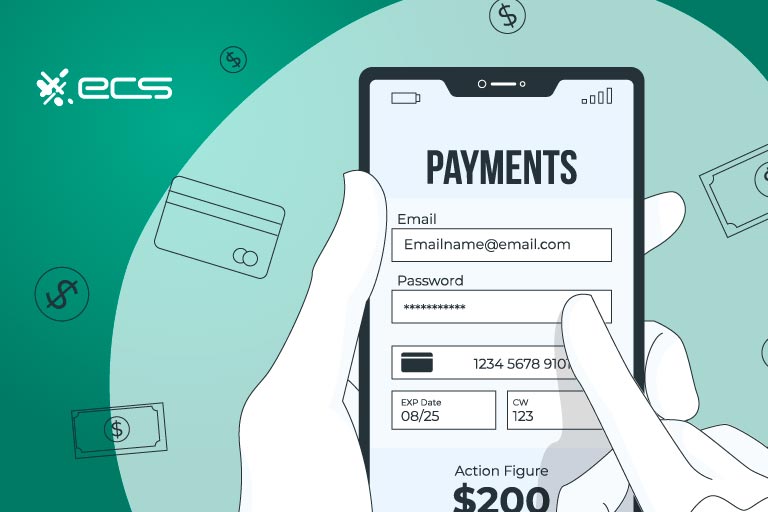What is a hosted payment page? This article is designed to go in-depth about what it is, who it can benefit, and all the features they offer business owners.
Most business owners and entrepreneurs are familiar with online checkout pages. These are the secure pages on a business website where customers can enter their credit card information and have it securely sent for processing.
These pages are often integrated into the online website that is run by the business selling goods. Since these pages handle credit card information and pass it along for payment processing and authorization, it means they need to be secure.
While this can be achieved and many companies do just this, some businesses prefer to have an option where they can still process credit or debit cards online. But without the need to manage the security or deal with the coding involved in creating a secure checkout process.
For other businesses, they don’t really need a fully featured shopping cart-style checkout page and instead, just need a simple page where customers can enter their billing information to pay an invoice or bill.
For these reasons and many others, businesses use what are called hosted payment pages. This feature allows businesses to accept payments online by having their customers enter credit card data on a site hosted by the payment processor or gateway.
Below, we’ll explain how hosted payment pages work and whether or not they can benefit your business and payment workflow.
Payment Gateway Basics
To understand hosted payment pages, it’s best to first learn what a payment gateway is and how it works. This is because hosted payment pages are a part of the payment gateway that businesses use to process credit cards.
When a business wants to process credit cards, either online or in person, it will need a merchant account. This is an account through a payment processing company. For example, ECS Payments is a well-known payment processor that offers merchant accounts to online and retail businesses.
A merchant account will give the business access to a payment gateway. The payment gateway is essentially the network that handles the communication of credit card data as it is processed and ultimately authorized. Regardless of the payment methods used, such as credit card or Google Pay, they travel along the payment gateway to be authorized.
Once a card transaction is authorized, the payment gateway initiates the transfer of funds from the customer’s issuing bank to your merchant account. From there, the business can withdraw the funds to their business bank account.
So it’s this payment gateway that most businesses and merchants interact with when they process credit cards.
Authorize.net and NMI are two examples of popular gateways used for online transactions. Used by millions of merchants around the world.
These gateways offer various tools and services to aid merchants. Many of these tools look to increase payment options for merchants as well as improve the overall payment transaction workflow. All of this is so merchants can process more transactions and make it easier to accept payments from customers.
One of these services offered by payment gateways is a hosted payment page. In the next section, we’ll explain what these pages do and how to use them.

What Is A Hosted Payment Page?
A hosted payment page is just as it reads, a webpage for payment hosted by a third party. The third-party sends customers to this page when making a purchase on your website.
The difference between a hosted payment page and a typical secure checkout page is that the host payment page is hosted by another server, generally run by your payment gateway.
This means your customers are actually taken to another website to complete their transactions. However, this process can be made to be mostly seamless for the customer. Many don’t even realize they are entering their payment info on a separate site from the merchant’s website.
In fact, some customers prefer these hosted payment pages, especially with smaller merchants. A hosted payment page means the customer doesn’t have to worry about whether the small merchant has all the security protocols in place to handle online transactions. Instead, all the credit card information is entered into the hosted payment page which is managed by a known payment gateway that specializes in secure transactions.
A hosted payment page transaction would look something like this.
Step 1
The customer browses a merchant’s website and adds an item to their shopping cart. The shopping cart is part of the merchant’s website.
The customer then clicks on the shopping cart or selects the option to checkout via a link on the website.
Step 2
From there, they are taken to another page still on the merchant’s website. This is where they may decide on shipping options and see the grand total for their purchase. There may be other options on this page as well if the merchant chooses to have them.
Step 3
When the customer goes to finalize the purchase and enter their payment information, the link they click instead takes them to a page away from the merchant’s website. This is the hosted payment page that is hosted on the payment gateway’s secure servers.
These pages can often be branded to include the color scheme or logo of the original merchant’s website. This makes the transfer appear seamless despite the customer being brought to a separate website.
Step 4
The customer enters their credit card information on the hosted payment page for authorization. When the transaction is authorized, the customer is returned to the merchant’s website. Usually, the merchant sets the page that customers are sent back to after the hosted payment page authorizes the transaction.
This is generally a “thank you” page or some other similar page.
Overall, the hosted payment page adds no extra steps to the checkout process. When implemented properly, it is virtually seamless for the customer.

Hosted Payment Page Vs API
You should now know how a hosted payment page works as well as how it relates to the payment gateway you use for credit card processing.
Now, let’s look at how that same transaction above would work if there was no hosted payment page and everything was handled by the merchant’s website.
API
To do this, the merchant’s website would access the API (application programming interface) of the payment gateway.
An API is essentially a protocol that is set to allow separate networks or systems to easily communicate data back and forth. It’s like a set of rules for both systems to follow. So even if they are totally different systems and serve different functions, they essentially “speak the same language” when communicating with each other.
APIs are found in almost all areas of the internet and digital communication. They are vitally important for online payment processing.
In this context, the API is how the merchant’s website interacts with the payment gateway. Since the customers will enter their credit card information into a page hosted by the merchant, it must be sent in some secure way to the payment gateway for processing.
API Integration
This is where the API integration comes in.
When processing via an API, you are collecting the customer’s credit card information and then handing it off to the gateway. This means you are also fully responsible for how secure that checkout page is.
Depending on your website, you may also need developers who understand APIs and credit card processing in order to implement the API into your own eCommerce store.
Although some shopping platforms make this easier, it still requires a certain amount of integration. A hosted payment page requires almost no integration other than simply adding a URL link pointing to the hosted payment page.
So with the added security and development needed to process via an API, you may be wondering why people would choose this method over a hosted page.
The answer is that using the API gives the merchant full control over the entire payment and checkout experience. By using the API, they keep the customer on their site the entire time. This means they can control exactly what the customers experience from start to finish.
The API also allows merchants who need advanced processing to use customized payment solutions. Because of the standardized nature of an API, developers can create custom apps and websites for accepting payments.
So while using an API does require more advanced knowledge and security responsibility, it does offer the most flexibility and control over the entire transactions from start to finish. For some businesses, this trade-off is worth it for their specific situation.

Hosted Payment Page Benefits
Hosted payment pages may have less flexibility than using an API, but they still offer many benefits that almost any type of business can take advantage of.
Below, we’ll go over the most common benefits and reasons that businesses will choose to use a hosted payment page over an API.
Security Concerns
This is probably the biggest benefit and that is a business transfers a majority of the security concerns of credit card processing to the payment gateway.
A payment gateway is set up to handle security. The gateway also has the infrastructure to make sure their entire gateway is secure for payment data. This also means the hosted payment pages they host are just as secure as the gateway itself.
One of the responsibilities that come with having a merchant account is the need to be PCI DSS compliant. PCI DSS refers to Payment Card Industry Data Security Standard.
This is a set of security standards and guidelines that all merchants or service providers must follow when they process or handle credit card information.
There are numerous levels of PCI DSS compliance. Various factors are involved in your processing that will determine what level of PCI DSS compliance you must meet.
By using tools like hosted payment pages, you can reduce your level of PCI DSS compliance necessary. Since you aren’t storing any credit card information on your own site or transferring it among your own servers, you have fewer security requirements to follow.
Overall, this is the main reason businesses choose to use a hosted page as it simply reduces one of the main security risks when processing credit cards.
Speed Of Implementation
Another benefit of hosted payment pages is the fact that a business owner can literally start accepting credit cards within minutes of using them.
Since there is virtually no coding needed, the setup time is only a few minutes. If you want to fully brand or white label your page, it can take longer. But even in those cases, it is very fast and easy to implement.
Merchants can access the hosted payment pages through the dashboard of their payment gateway. For example, if you contacted ECS Payments and applied for a merchant account, you could choose your payment gateway as well. Let’s assume you chose Authorize.net as your gateway.
You would simply log into your Authorize.net merchant dashboard and click on Account. From there, you simply go to Payment Forms and create your form right there. You can use a default form or customize a variety of options such as the header, footer, and even the fonts for different areas.
Overall, a hosted payment page is the fastest way to start accepting payments from an eCommerce website.
If you want to learn more about hosted payment pages, contact ECS Payments and speak with one of our payment solution experts.

Increased Trust For Small Businesses
Many consumers today are familiar with hosted payment pages even though they may not know the technical term for them or how they work. But many businesses large and small use hosted payment pages. In fact, customers are used to the flow of being taken to hosted pages for checkout.
Because of this, many customers feel more comfortable when taken to a hosted page. Especially when dealing with a smaller eCommerce website. The consumer knows they are entering the credit card information directly into a payment gateway and not into the eCommerce site’s servers.
If you are starting a new eCommerce business, sometimes a great way to instill trust and avoid cart abandonment is by using a hosted payment page. Some merchants even advertise during the checkout process that they are using a hosted payment page because it can lead to higher completed sales.
Change Your Website More Easily
If there is ever a need to overhaul your website or make major updates, this can wreak havoc with your security features if you are using an API and your own checkout page. After a major site overhaul, you will need to test the various functions of the API and checkout system to make sure it is still secure.
Even with PCI compliance, some merchants are required to perform third-party scans and penetration testing after large software changes or updates.
With hosted payment pages, none of that is needed. Once the site is updated, changed, or even moved to a new host, you simply use the same hosted payment page as you did before. As far as your credit card processing, nothing changes even if you overhaul your website.
This can save a lot of time and resources for those who want to rebrand an entire site without having to deal with changing their payment workflow.
Can Be Combined With Customer Storage Options
Many hosted payment pages, like those available through ECS Payments and their partner gateways, include ways for businesses to store customer billing information on the gateway servers as well.
This is great for recurring business models. Or simply for storing customer billing information so they can check out faster in the future.
Storing this sensitive information locally on your website is a huge security hassle. But it can be done easily using a payment gateway. This can then be combined with a hosted page so that returning customers already have all their information filled in when they visit the checkout page.
All they have to do is confirm the purchase. This drastically improves conversion ratios and reduces abandoned carts.
One of the main reasons people abandon carts is they find the checkout process too tedious. By auto-filling these checkout pages, your customers are far more likely to complete the purchase.
This can be done with hosted payment pages and customer storage, which are both available through a payment gateway.
Contact ECS Payments to learn about these powerful gateway tools and how they can be applied to your business.

Why You Need A Hosted Payment Page
The reasons for needing a hosted payment page can vary quite a bit between different businesses. But there are a few situations where a hosted payment page works perfectly and we’ll go over some of them below.
New Business
New businesses can often benefit the most from hosted payment pages. Hosted payment pages allow any business to get up and running much faster. If you are starting a new business, then you likely know how important cash flow is.
If you have to wait for days or weeks to get a secure checkout page working, it means you aren’t bringing in sales and cash flow. With a hosted payment page, you can accept credit cards the same day you recieve approval on your merchant account.
Also, many new businesses are operating under a tight budget and there may not be money available to pay coders and developers. With a hosted payment page, most business owners can set it up themselves with minimal effort.
They also have the peace of mind of knowing it’s completely secure and there are no security holes they may not be aware of.
Only Sell A Single Product
Many websites are set up to sell a single product or service. This can be an educational course or a single physical product. But in situations like these, you don’t need a complex shopping cart setup and checkout system
Since you’re only selling one product, you want to get the customer to the checkout screen as soon as possible after they’ve decided to purchase.
You can do this easily with a hosted payment page. It’s the reason these work great for single product websites.

Want To Minimize Risk
If you’ve read about large-scale data breaches at companies that ended up costing them millions of dollars, you may be concerned about hacking and security for your own website.
Having a hosted payment page is perfect if you don’t want to worry about those concerns. Since you don’t store any billing information locally, you have nothing to worry about regarding data breaches.
You should still practice strong security protocols and be PCI compliant. But your risk and liability are far less when using hosted payment pages.
Sell Digital Products
Digital products are another area where hosted payment pages can work perfectly. These types of websites usually have no purchase options for the customer to choose from, other than a single digital download. For these situations, a hosted payment page is all the business needs to start accepting orders.
The hosted payment page returns the customer to your website where they continue the download of their product after transaction authorization.
Run Different eCommerce Stores
Some business owners run different websites all selling the same products, or in some cases different products. Having a custom checkout page for each of these different websites can be difficult to set up and manage.
Using hosted payment pages, you can scale your business much easier or add new websites to sell your products.
Creating a new hosted payment page only takes a few minutes. So once you have a new site set up, you can immediately implement the payment page so you can take orders as soon as it launches.
This can also be helpful for marketing purposes such as A/B testing to see which site converts better.
Get Started With Hosted Payment Pages
If you are looking to improve your eCommerce business with hosted payment pages, contact ECS Payments.
We offer merchant accounts and access to popular payment gateways with the latest tools and features to help your business succeed.
Contact ECS Payments today to learn more about hosted payment pages and they can benefit your business.
